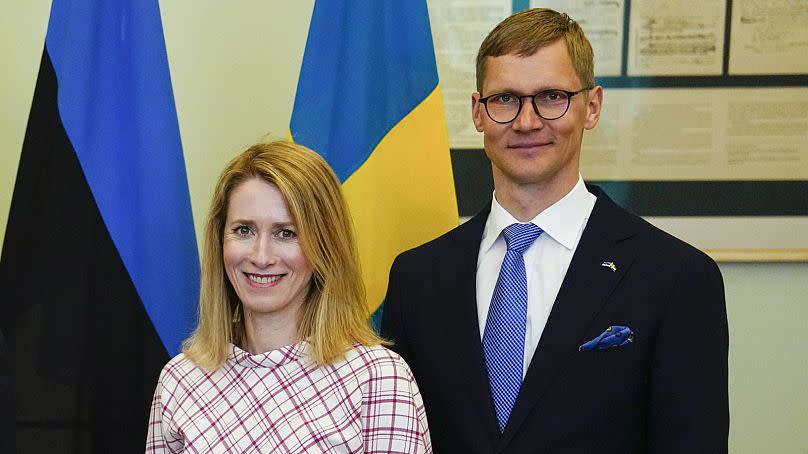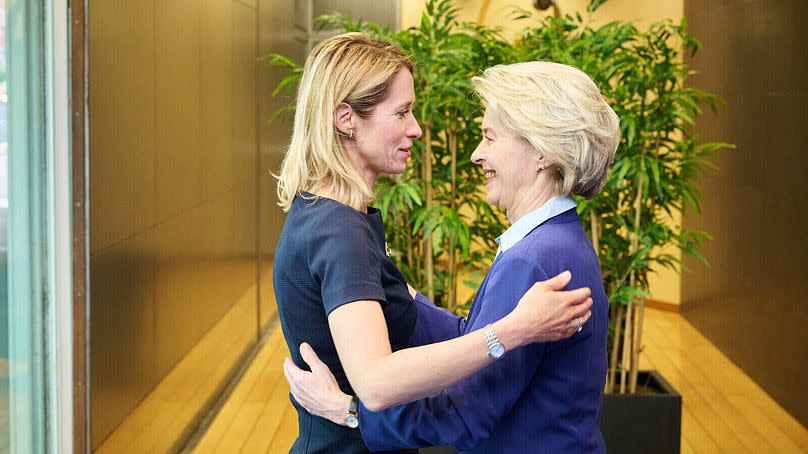Estonian Prime Minister Kaja Kallas, one of the EU’s most outspoken Russia critics, is tipped to step into the most powerful foreign policy role in Brussels in a move that could send a strong signal to Moscow.
The bloc’s 27 leaders have pencilled in Kallas’ name for the EU’s top diplomatic job, currently held by Spain’s Josep Borrell, with a final decision expected this week.
If her nomination is formalised by EU leaders on Thursday and then approved by the European Parliament’s foreign affairs committee, she will become the first eastern European in the role and the first Estonian to ever clinch one of the EU’s top jobs.
Since Russia launched its full-scale invasion of Ukraine in February 2022, Kallas has been a driving force in EU efforts to punish Russia with sanctions, send military support to Ukraine, and bolster the bloc’s own defence capacities.
The sheer vigour of her anti-Russia stance, which predates the war, had sparked speculation her candidacy for the top diplomat role could be blocked for fear of provoking Moscow.
Her unsparing response to Russia’s aggression has even earned Kallas the status of a wanted person in Russia, a response to her efforts to remove Soviet-era World War II monuments in her Baltic nation, which the Kremlin described as “hostile action toward historic memory.”
But diplomats told Euronews that her ruthless stance on Moscow was not a major stumbling block in her nomination. Eastern European diplomats are particularly supportive of bringing their own perspective to an EU diplomacy which has been for years dominated by western Europeans.
Her imminent nomination also comes despite the European liberal group she belongs to slipping to become the fourth biggest political force in the European Parliament following disappointing results in June’s European elections.
Popular abroad, support plunging at home
The prospective move to Brussels comes as Kallas struggles with dipping approval rates domestically, despite maintaining a strong international profile.
Her approval rating slumped to just 16% in January, following months of decline since last summer, when reports of her husband’s business ties to Russia first broke.
In August 2023, it emerged that Kallas’ husband Arvo Hallik held a stake in a logistics company that had continued operating in Russia since the war in Ukraine broke out more than a year and a half earlier. Kallas has since denied any prior knowledge of the company’s Russia ties and described the domestic backlash as a political witch hunt.
But the scandal incited minimal international response, with the exception of a jab by Hungarian foreign minister Peter Szijjarto, who accused Kallas of “hypocrisy” when she censured Viktor Orbán’s handshake with Vladimir Putin during an encounter in China.

Kallas also came under scrutiny in March when EU diplomats accused her government of artificially inflating reimbursements for arms sent to Ukraine under the so-called European Peace Facility (EPF), which allows member states to get partially reimbursed for arms donations.
The amounts requested by Estonia outstripped other member states that had made similar donations, suggesting Tallinn had been calculating its pay-backs based on the price of new military kits while sending older equipment to Kyiv.
The Estonian foreign ministry hit back at the reports, claiming it had acted in accordance with the rules and that Ukraine had “never complained” about the quality of the equipment it was receiving from Estonia.
A “pragmatic” politician
One of the challenges facing Kallas as she prepares to be grilled by the European Parliament’s foreign affairs committee will be to demonstrate her credentials when wielding the EU’s diplomatic influence in other regions of the world.
She is not considered such an authoritative voice when it comes to other world regions including Africa, the Middle East and Latin America. She could be tasked with forging the EU’s diplomatic stance on the conflict raging in Gaza, and on instability brewing over in other regions such as the African Sahel.
But diplomats said her track record of “pragmatic” politics means she is well placed to broker EU positions on global issues. The role is constrained by the need for all EU member states to unanimously back foreign policy decisions, with Kallas seen as having the necessary skills to forge consensus amongst 27 foreign ministries which are at times deeply divided.
These divisions came to the fore in the aftermath of Hamas’ October 7 attack on Israel and the Israeli forces’ ensuing offensive in the Gaza Strip.


Estonia is considered to have espoused the EU’s well-rehearsed line on firmly supporting Israel’s right to self-defence while calling for the respect of international humanitarian law in Gaza. In short, Kallas is considered neither among the most pro-Israel nor most pro-Palestine of EU leaders.
But she could have her work cut out to wield diplomatic influence and relevance among partners in the region. In fact, she has been most vocal on the instability in the Middle East when making parallelisms with the situation in Ukraine, questioning why the West couldn’t repel Russian strikes on Ukraine in the same way as they did when Iran launched its first ever aerial attack on Israel in mid-April.
Keeping it in the family
Kallas is no stranger to EU institutions. Her father, Siim Kallas, served as Estonia’s prime minister between 2002 and 2003 before switching Tallinn for Brussels in 2004, where he served as Commissioner for a decade in the two executives of José Manuel Barroso.
A lawyer by training, Kallas entered politics in 2010, and a year later was elected to the Estonian parliament, the Riigikogu. She became a Member of the European Parliament in 2014, where she dipped her toes in a range of policy areas from tech to energy to foreign policy.
Since returning to Estonia and becoming prime minister in 2021, she’s been credited with strengthening the international stature of her country, the EU’s fourth smallest state and home to just 1.4 million citizens.
On her website, Kallas cites golf, skiing, rollerblading and puzzles as her main hobbies.

